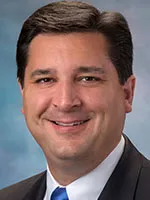Senior Reporter
House Committee Hosts WRDA ‘Members’ Day’ Hearing

[Stay on top of transportation news: Get TTNews in your inbox.]
The transportation panel in the U.S. House of Representatives convened this month for a hearing to give members an opportunity to request support for water infrastructure projects.
Input from this “Members’ Day” will assist in crafting the upcoming Water Resources Development Act of 2024.
Senior Republican leaders pointed to the potential for considering various provisions related to freight connectivity and supply chain improvements along the nation’s busy waterways. The bill’s sponsors intend to advance the comprehensive policy measure this year.
“WRDA is a critical legislative vehicle, ensuring communities’ water resources needs are met nationwide,” Rep. David Rouzer (R-N.C.), Water Resources and Environment Subcommittee chairman, said Jan. 11. He is a key architect of the WRDA bill.

Rouzer
“Navigation, flood control, beach nourishment, ecosystem restoration, hydropower, water supply and recreation at [Army Corps of Engineers] facilities are all important issues we will address in this year’s WRDA,” he added. “In other words, our nation needs WRDAs to keep our communities safe and functional.”
House lawmakers’ policy requests at the hearing ranged from environmental reviews for dams and aquifers to expansion projects at inland ports.
Rep. Derek Kilmer (D-Wash.), for instance, is seeking backing for the Duckabush Estuary Restoration Project in the Evergreen State.
“The Duckabush tidelands are important to several local tribes and the public,” Kilmer told the panel. “When the restoration project is completed and the river flows freely, access to the tidelands will be more limited.”
For Rep. Jim Costa (D-Calif.), the enlargement of Eastman Lake in Madera County is a priority.
“The proposal would increase the lake’s capacity from 150,000 to 200,000 acre-feet,” he explained. “This project would provide additional flood control benefits, reduce demand for groundwater, and help meet water demands in the region.”
Rep. Bobby Scott (D-Va.) requested the bill’s authors include Norfolk in a federal temporary relocation assistance program because of the ongoing Norfolk Coastal Storm Risk Management project.

Scott
“This would allow Norfolk to join other communities in extending temporary relocation assistance to those that are impacted by the nonstructural program of the Norfolk [Coastal Storm Risk Management] project,” Scott said.
The project is meant to reduce risk from coastal flooding and damage caused by severe weather events.
Rep. Hal Rogers (R-Ky.) pressed colleagues to avoid including in the WRDA measure a water reallocation study for Wolf Creek Dam in the Bluegrass State.

Rogers
“This request would maintain historic WRDA and Energy and Water Appropriations language prohibiting a water reallocation study at Wolf Creek Dam on Lake Cumberland,” Rogers indicated. “The region surrounding the dam is one of the poorest in the nation, and a reallocation study might lead to increased rates, which would place financial hardship on my constituents.”
The WRDA bill has been enacted biennially since 2014. It approves funding for ports, dams, waterways, canals and locks. Projects under the jurisdiction of the Army Corps of Engineers are a priority for transportation policymakers.
According to background House leaders prepared: “WRDA projects typically require two separate types of authorization: the authority to study the feasibility of a project, followed by the authority to construct, operate and/or maintain the project. Completed feasibility studies are submitted to Congress in the form of a chief’s report from the U.S. Army Corps of Engineers Chief of Engineers.”
Ben Gardiner, a cybersecurity expert at the National Motor Freight Traffic Association, shares practical, effective strategies to shield your business. He offers insights into operating systems and a comprehensive guide to cyber resilience. Tune in above or by going to RoadSigns.ttnews.com.
On the other side of the Capitol, Senate Environment and Public Works Committee Chairman Tom Carper (D-Del.) is guiding the upper chamber’s update of the biennial infrastructure legislation.
“The corps is directly responsible for operating America’s water highway, a 12,000-mile-long system of inland waterways that are vital to domestic and international commerce,” the EPW leader said in November. “Each year, that expansive system moves more than 500 million tons of commodities, including 60% of our nation’s agricultural exports. The corps’ work to help operate and maintain that system results in an economic benefit of nearly $14 billion each year.
“Given the range of benefits of corps projects, it should come as no surprise that WRDAs continue to enjoy broad bipartisan support. Our most recent WRDA passed the Senate in 2022 by a vote of 93-1, and it eventually carried the National Defense Authorization Act to President [Joe] Biden’s desk.”





